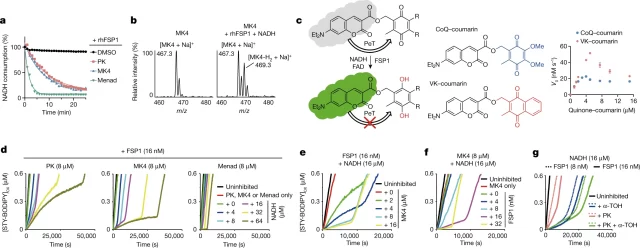Inconspicuous vitamin K can effectively inhibit cell ferroptosis
- Normal Liver Cells Found to Promote Cancer Metastasis to the Liver
- Nearly 80% Complete Remission: Breakthrough in ADC Anti-Tumor Treatment
- Vaccination Against Common Diseases May Prevent Dementia!
- New Alzheimer’s Disease (AD) Diagnosis and Staging Criteria
- Breakthrough in Alzheimer’s Disease: New Nasal Spray Halts Cognitive Decline by Targeting Toxic Protein
- Can the Tap Water at the Paris Olympics be Drunk Directly?
Inconspicuous vitamin K can effectively inhibit cell ferroptosis
- Should China be held legally responsible for the US’s $18 trillion COVID losses?
- CT Radiation Exposure Linked to Blood Cancer in Children and Adolescents
- FDA has mandated a top-level black box warning for all marketed CAR-T therapies
- Can people with high blood pressure eat peanuts?
- What is the difference between dopamine and dobutamine?
- How long can the patient live after heart stent surgery?
Inconspicuous vitamin K can effectively inhibit cell ferroptosis.
Vitamin K is generally known for its importance in blood clotting.
In a new study, researchers from the Helmholtz Center Munich in Germany, the University of Ottawa in Canada, and Tohoku University in Japan report a new function for vitamin K. They found that the fully reduced form of vitamin K acts as an antioxidant and effectively inhibits ferroptosis .
Iron in cells plays an important role in ferroptosis, a natural form of cell death characterized by oxidative damage to cell membranes.
In addition, they determined that FSP1 is a warfarin-insensitive enzyme that reduces vitamin K, but the identity of this vitamin K reductase has remained unknown for more than half a century.
The related research results were published online in the journal Nature on August 3, 2022, with the title “A non-canonical vitamin K cycle is a potent ferroptosis suppressor”.

In the past few years, ferroptosis has been implicated as a driver of Alzheimer’s disease and acute organ damage, among many other diseases.
Therefore, the results of this new study raise the notion that vitamin K therapy may be a new and powerful strategy for ameliorating these ferroptosis-related diseases.
Vitamin K is a powerful ferroptosis inhibitor
Given that blocking ferroptosis is considered a very promising approach to the treatment of many degenerative diseases, scientists are extensively exploring new mechanisms and compounds that regulate ferroptosis.
To identify these new molecules, the authors systematically studied some naturally occurring vitamins, as well as their derivatives.
“Surprisingly, we found that vitamins K, including phylloquinone (also known as vitamin K1) and menaquinone 4 (also known as vitamin K2), were able to effectively Protects cells and tissues from ferroptosis. ”
Demystifying the long-sought vitamin K reductase FSP1
In 2019, Dr. Marcus Conrad and his research team have identified an enzyme that is a novel and powerful ferroptosis inhibitor: FSP1 (ferroptosis suppressor protein-1, ferroptosis suppressor protein 1).
They have now discovered that the fully reduced form of vitamin K (vitamin K hydroquinone) acts as a powerful lipophilic antioxidant, preventing iron toxicity by trapping oxygen radicals in the lipid bilayer.
Furthermore, they determined that FSP1 is the enzyme that efficiently reduces vitamin K to vitamin K hydroquinone, thereby driving a new non-canonical vitamin K cycle.
Given that vitamin K is critically involved in the blood clotting process, they further found that FSP1 is responsible for the vitamin K reduction pathway and is insensitive to warfarin, one of the most commonly used anticoagulants.

FSP1 maintains vitamin K hydroquinone, which acts as a free radical trapping antioxidant. Image via Nature, 2022, doi:10.1038/s41586-022-05022-3.
Breakthrough in understanding vitamin K metabolism
Unraveling the identity of this enzyme solves the final mystery of vitamin K metabolism in blood coagulation and elucidates the molecular mechanism by which vitamin K acts as an antidote to overdose of warfarin. Dr. Conrad emphasized, “Our results thus link the two fields of ferroptosis research and vitamin K biology.
They will be a stepping stone in the development of new therapeutic strategies for ferroptosis-related diseases.” Furthermore, since ferroptosis is likely one of the oldest types of cell death, these authors hypothesized that vitamin K may be one of the oldest types of natural antioxidants. “Therefore, new aspects of vitamin K’s role in the evolution of life are expected to be uncovered,” explained Dr. Conrad.
References:
Eikan Mishima et al. A non-canonical vitamin K cycle is a potent ferroptosis suppressor . Nature, 2022, doi:10.1038/s41586-022-05022-3.
Inconspicuous vitamin K can effectively inhibit cell ferroptosis
(source:internet, reference only)
Disclaimer of medicaltrend.org
Important Note: The information provided is for informational purposes only and should not be considered as medical advice.



